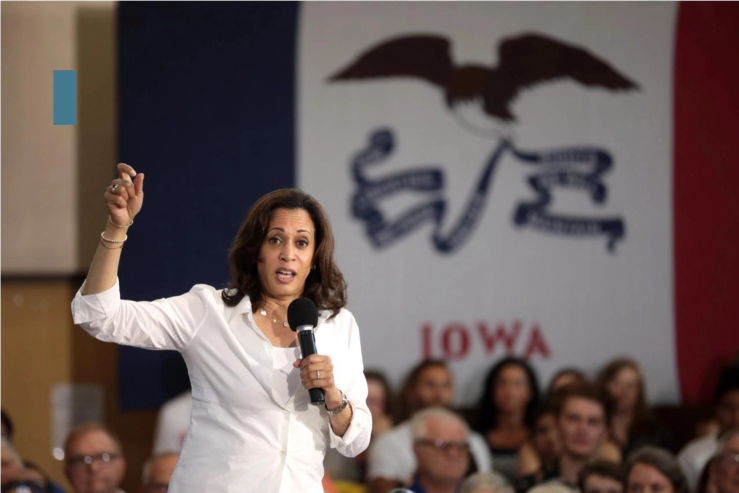The News
The stampede of endorsements for Kamala Harris means the party might avoid one scenario many of them feared if Biden stepped down — a chaotic month-long battle for the nomination in which the eventual winner would emerge beaten up by attacks and oppo research from their rivals.
But now comes the hard part: Selling Harris to a general electorate that has so far been wary of her in polls. Harris is still relatively undefined and has a chance to reintroduce herself to the nation on her own terms. But she had that same shot five years ago — and it went extremely poorly.
In this article:
Benjy’s view
The problem for Harris is that she is burdened by what has been. Her political brand did not just fall out of a coconut tree, it exists in the context of the 2020 election cycle, a four-year race to the left among Democrats that Joe Biden’s election put a stop to and that the party is still recovering from.
Her participation in that contest was not unique, nor is she the only Democrat whose image was hurt by it (Remember when Beto O’Rourke was the future of the party?). But she and her allies are going to have to be nimble in how they present her record and how they handle questions about her older positions and rhetoric. And a lot of those questions will date back to this period.
Harris began her first presidential race as one of the frontrunners. When I attended her first big New Hampshire event in 2019, there were lines around the block in the freezing snow to see her. She was a compelling speaker who had developed a devoted following among MSNBC-watching, rank-and-file Democrats by grilling Republican witnesses in hearings with clever questions and generating crowd-pleasing moments for partisans.
But it became clear pretty quickly that Harris had major problems as a candidate.
She picked a difficult time to run: Her most relevant experience was being a prosecutor at a time the party was increasingly suspicious of the criminal justice system, which led her to shy away from the topic.
She had a poor theory of her election: She decided she should fashion herself as a progressive warrior in response, which was not her natural role, rather than as a pragmatic law-and-order type for less ideological Democrats.
And she had a bad case of “lawyer brain” that made it even harder to pull off this balancing act: She was reluctant to give decisive answers on difficult questions, which led to some of her most damaging moments.
Harris was not an experienced policy hand, and often found herself caught in the middle of a nonstop debate between different left-wing factions over highly specific proposals. In the most notable instance, she signed onto Bernie Sanders’ “Medicare for All” bill, but then repeatedly waffled on its elimination of private plans in a series of debates and interviews before putting out her own still-ambitious compromise that only seemed to anger Sanders-style progressives.
Like other Democrats, she was also constantly confronted with sudden new demands from the left and struggled to address them. In one 2018 moment that Republicans are already beginning to resurface, she didn’t immediately dismiss a push to “Abolish ICE,” telling an interviewer that the agency should consider a “start from scratch” approach. In her eyes, she was likely trying to avoid the question, but the answer made her one of the most prominent Democrats to even consider the idea. In 2019, Julian Castro forced the party into an esoteric conversation over decriminalizing border crossings (they still would be deportable civil offenses) that roped Harris into his position live onstage at a debate. Biden had enough experience to distance himself from it and the issue soon disappeared along with Castro’s campaign.
Fortunately for Harris, the job may play more to her strengths this time. She doesn’t need to sift through dozens of white papers from competing progressive groups, since she’s already invested in a simpler party-wide plan of protecting abortion access, defending democracy, and painting her opponent as out for himself and his rich friends. So far, she’s earned strong reviews for her ability to carry that message while the party was in crisis this last month. And while she’s unpopular in polls, voters don’t know her well, and she’s in a race to start fresh with a new brand just as Trump races to define her.
Harris will likely have more room to tack to the center if needed this time. At this point, the party is used to its leaders calling for tougher immigration enforcement and crackdowns on crime, even in deep blue cities, and Biden already committed the party to a border security bill and executive order limiting new asylum claims. Her “smart on crime” approach in California, which emphasized both strict policing and new reforms, made her a “cop” to Democrats in the 2020 cycle. Now it looks like the median Democratic position. “Medicare for All” barely even comes up any more as a party divide.
But Democrats should have no illusions about the challenge ahead. When pundits say the party has the most deep and talented bench of potential presidents in decades, they’re correct. But one legacy of the 2020 cycle is that most of the top tier appeared on the national scene after it finished, at which point rising politicians had learned to avoid the same pitfalls. A running mate who fits that description might help, but undoing the damage will be a serious task.
Room for Disagreement
At the Washington Post, Perry Bacon, Jr. made the case on Monday that Harris’ poor record as a presidential candidate has been overstated. While her stumbles were real, she also struggled to overcome a primary electorate that repeatedly showed it was fearful of picking a woman or minority to lead a ticket against Trump. “The withering critiques of Harris’s campaign back then reflected a complicated reality: A party that prides itself on diversity really wanted to pick a White guy,” Bacon wrote. Similarly, her role as VP has been dismissed on the right as a sop to identity politics, but Bacon notes she had traditional credentials for the position and the selection is often used to balance out a ticket in similar ways.
Notable
- One excellent piece of early news for Harris: Her campaign and affiliated committees reported that they raised a record $81 million in the 24 hours since Biden dropped out, 60% of which came from new donors.


